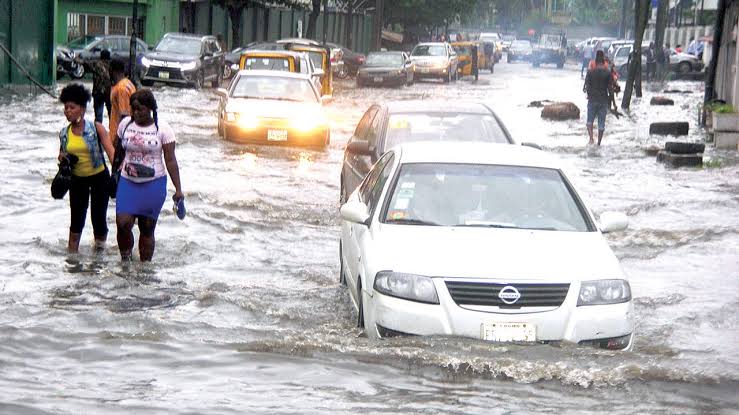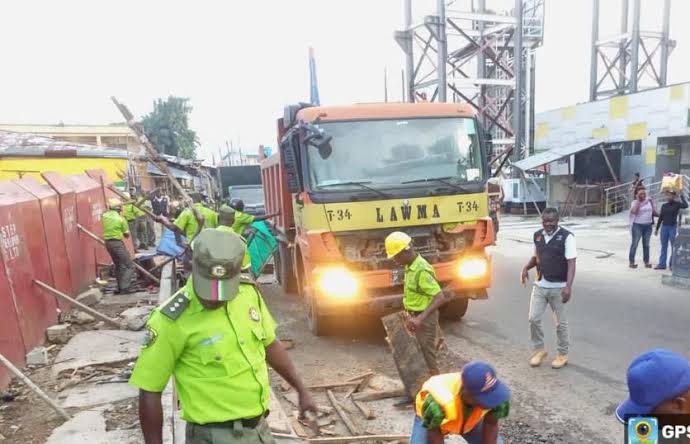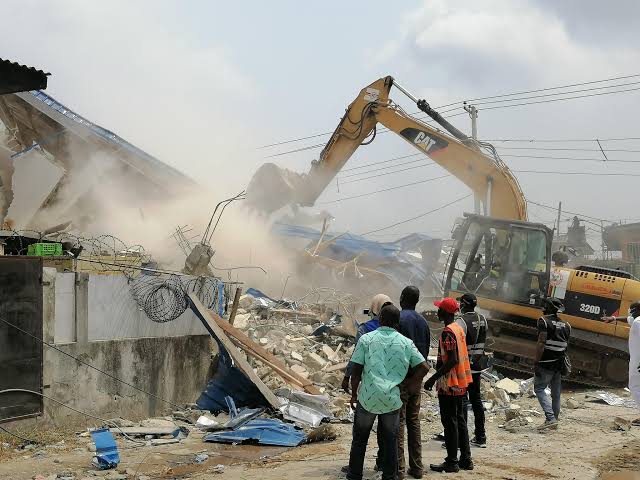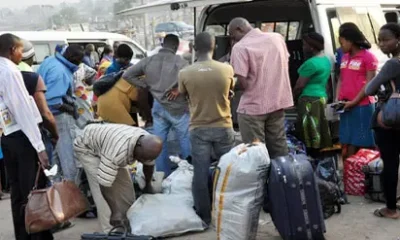Special Features
Lagos: Flood, Building Collapse, Demolition And Matters Arising

Lagos, a bustling metropolis teeming with energy and life, has long grappled with seasonal flooding and a disturbing surge in building collapses.
Beyond mere inconveniences, these issues have claimed precious lives and wreaked havoc on properties, exacting heavy tolls on residents and business establishments.
Editor’s Pick
-
NCAA Lifts Suspension On United Nigeria Airlines
-
NDLEA Intensifies Efforts Against Illicit Substance, Destroys Three Acres Of Cannabis Farm In Sokoto
-
Road Accident Claims Three Traditional Rulers In Oyo
The annual trail of devastation exacerbates the need for a comprehensive approach to tackle these sad occurrences and safeguard the well-being of its ever-increasing residents.

A flooded road in Lagos
In response to the recurrent menace, the Lagos State Government has recently embarked on a holistic drainage cleanup initiative. A drastic situation, they say, calls for a drastic solution; the severity of the situation prompted stringent measures, including the temporary closure of markets and outright demolition of distressed buildings.
Speaking on reasons for market closures in the state, the Managing Director/Chief Executive Officer of Lagos Waste Management Authority (LAWMA), Dr. Muyiwa Gbadegesin, disclosed that markets were closed due to the failure of their various management to fully meet the stipulated mandatory safety and environmental measures earlier outlined by the Authority.

LAWMA Officials Removing Structures built on Drainage system
“Our primary concern is the safety of the people and environmental well-being at marketplaces. Reopening is contingent upon strict adherence to the safety conditions set forth by LAWMA. It is imperative that all necessary precautions are taken to prevent any potential risks,” he said.
Similarly, the Commissioner for Physical Planning and Urban Development, Oluyinka Olumide, while supervising the demolition exercise, said occupants of the affected buildings were served notices but refused to vacate them.
He noted that the state government was compelled to resort to the demolition of the structures to protect lives as most buildings failed the structural integrity test.
In his words, “The primary responsibility of the government is to protect lives, so we can not wait and allow the buildings to collapse and kill people.”

Lagos State Building Control Agency (LASBCA) Demolishing Buildings adjudged to have failed Structural Integrity
The ongoing demolition of buildings and cleanup of drainage systems is a crucial facet of Lagos’s strategy to mitigate perennial environmental hazards. As the government’s decisive action targets structures that impede the natural flow of water, it underscores the government’s commitment to enhancing the overall resilience of the mega city by addressing the root causes of flooding and incessant building collapses.
However, the move has continued to generate mixed reactions, with some commending the act as a welcome development and others accusing the state government of specifically targeting properties owned by south-easterners.
As the demolition campaign progresses, it becomes imperative to emphasize the importance of transparency and clear communication amid these accusations.
Transparency not only ensures fairness but also serves as a powerful tool in dispelling rumored ethnic biases in selecting structures for demolition. By openly communicating the objective criteria used to identify buildings at risk, the government can counter speculations and foster trust among various ethnic communities.
Additionally, the state government must formulate compensation and resettlement plans for affected residents, particularly those with valid documents. Regardless of ethnic background, the government must establish fair and transparent guidelines for compensating individuals who may lose their homes due to the demolition.
In conclusion, the Lagos State Government’s proactive measures, including the rigorous drainage cleanup initiative and building demolitions, demonstrate a commendable commitment to averting the devastating consequences of recurrent floods and building collapses. The prioritization of public safety is paramount, and the government’s decisive actions reflect the urgency of addressing these life-threatening challenges.
Further Reading
-
Emir Of Ilorin Reaffirms Stance Against Interceding For Law Violators
-
Lagos Govt Cautions Artisans Against Unsupervised Construction Projects
-
Not From Us – FAAN Speaks On Banning Use Of ‘Ghana Must Go’ At The Airports
While recognizing the necessity of such interventions, the government should bear in mind the potential human cost. Resettlement plans should be cautiously approached, considering Lagos’s existing housing deficit. Preventing additional homelessness becomes not just a responsibility but an imperative for a truly resilient megacity.
In safeguarding lives and properties, the government must equally prioritize the welfare of its citizens, ensuring a just and equitable society for all Lagosians to thrive.
Click To Watch Our Video Of The Week
Advertise or Publish a Story on EkoHot Blog:
Kindly contact us at [email protected]. Breaking stories should be sent to the above email and substantiated with pictorial evidence.
Citizen journalists will receive a token as data incentive.
Call or Whatsapp: 0803 561 7233, 0703 414 5611














